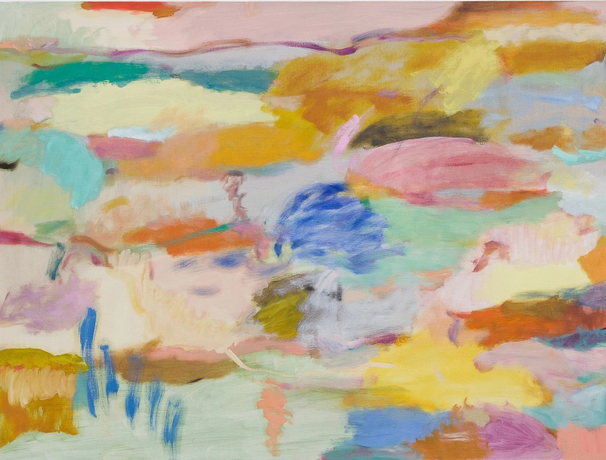
GAVLAK Palm Beach is pleased to present Alexis Teplin’s solo exhibition, Come, stare, she makes a gesture. Raised in the Bay Area, and currently based in London, Teplin examines the complexities of place, gender, and diaspora through painting composed in correspondence with a multigenerational lineage of artists and writers. Teplin, informed by an investigation of Californian history, utilizes the stitched, warm palette of feminized interior spaces within images of the West’s dramatic topography. In this exhibition of new work, Teplin investigates her origins, creating vivid, earthy abstractions that probe conceptions of the frontier. Come, stare, she makes a gesture will be on view at GAVLAK Palm Beach from October 19 through November 19, 2023. There will be an opening reception on October 19 from 5 – 7pm.
“Who is the most important person you’ve ever met?”
“A mountain.”
-Etel Adnan, from an interview as recounted in Journey to Mount Tamalpais
Our conversation begins, fittingly, from afar. Through my computer, Alexis Teplin’s paintings evoke memories of my own Californian youth: there are deep burgundies the color of plums or blood, a sharp, homey teal that meets the chalky beige of an eroded bluff. Derived from Teplin’s childhood recollections of Northern California, her compositions recall the ragged edges of new mountains, of cliffs that cede their rock to the sea. These familiar, earthy colors quickly devolve into fluorescent purples and pinks, a pairing that conjures the tones and textures of the Californian home. In Tamalpais (for E) (all works 2023), rectangular, pastel swatches invoke both the rolling hills for which the painting is named and the patchwork of a quilted bedspread. Teplin’s kaleidoscopic compositions reflect her interest in the frontier’s dual domesticity and wildness: in Come, stare, she makes a gesture, a pastiche of dusty pinks and browns resembles silken shirts flapping on a laundry line, maybe, or Marin County kitchens glowing in the afternoon.
Domesticity is multi-disciplinary and conversational, bound by social, physical, and emotional performance; so too is Teplin’s work. Paintings are often only the beginning of Teplin’s larger projects, which can include the production of clothing, installations, and short-form theatre; the exhibition’s title is a line of dialogue from a prior presentation at Liverpool’s infamous Bluecoat art center. The resulting works gesture both outside and within: Berkeley (after D) references the abstract vistas of Bay Area acolyte Richard Diebenkorn, while its rectangular markings and rich fuchsias bear similarity to Tamalpais (for E)’s colorful tapestry. Bell alludes to English painter Vanessa Bell, though the painting’s soft curve down its middle recalls that of a steep coastline or a church’s gong. Teplin’s multifaceted artworks converse with California’s literal and figurative artistic landscapes, acknowledging the collaboration intrinsic to life out West.
Northern California exists primarily in my head: I see a hillside wrought with swaying yellow grass, the home of a close friend’s parents, a long patio. For Teplin, too, the place remains distant, as though recollected from a dream: her canvasses are haunting mirages of color, texture, and feeling. These paintings give form to Teplin’s—and the West’s—early history, combining diluted views of Bay Area sights with light-filled meditations on domesticity. With Teplin’s company, the frontier’s towering mythos doesn’t feel so daunting—in fact, it is just within reach.
Text by Claudia Ross










